Promoting student community and communication through authentic learning tasks designed for group work in large 1st and 2nd year biology subjects
Abstract
This study, conducted at the University of Wollongong (2010-2011), evaluated assessment tasks introduced in two large biology subjects, Biol103 (471 students) and Biol213 (300 students). We aimed to increase relevance, interest and motivation by promoting deeper learning through group work. The tasks were designed to contextualise lecture content through exposure to current research. In Biol103, guidance on how to complete the group project was given during the first of three, 1.5-hr dry practical classes (1:20 teacher to student ratio). The group findings were presented via a poster in the 2nd, and an oral seminar in the 3rd dry practical class. In contrast, the assessment task in Biol213 was web-based, and teacher interaction was limited to one 30-min lecture outlining the details of the assignment. Groups reviewed a research article, of their choice and the final review manuscript was posted on the subject website. Seventy percent of Biol213 and 90% of Biol103 students responded that group work improved community, communication and collaborative skills. However, student perception of subject relevance was only improved in Biol103. We conclude from these results firstly, that group work is beneficial in terms of improving student connectedness and feeling of community in large subjects, and secondly, that web-based assessments, although convenient, may not be as effective for improving interest and relevance as assessments with a higher level of face to face interaction and teacher guidance.Downloads
Published
2011-08-10
Issue
Section
Abstracts
